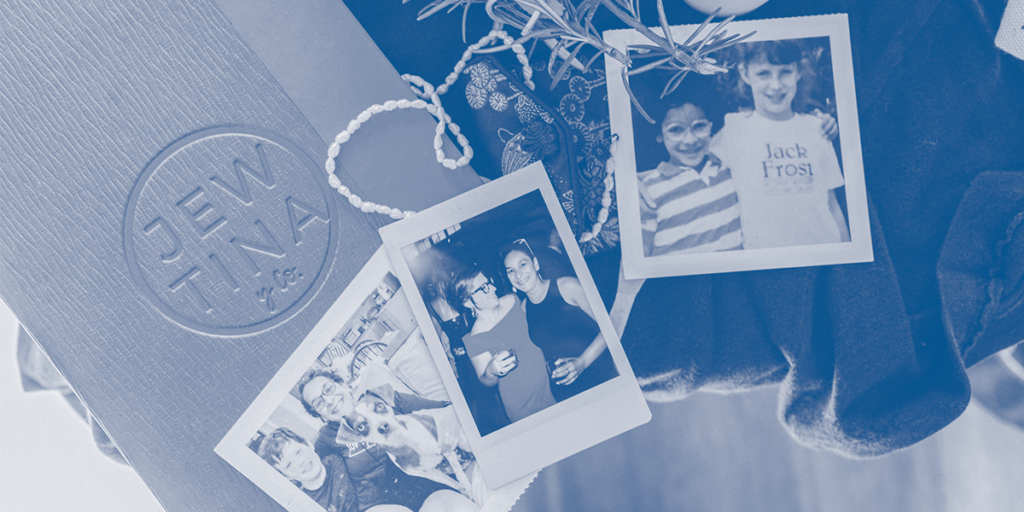Hello and welcome to the first Berman Archive Newsletter! Our goal is to share glimmers of the American Jewish Community, past, present, and possible. In the months since we relaunched the Berman Archive, we’ve had many excellent contributions to our blog from Jewish scholars and professionals, connecting the archive to their work. We’ll be sharing new posts each month along with American Jewish news with interesting intersections to the many artifacts in the Berman Archive. So read along each month to get a sense of the ways the American Jewish present connects to the past as seen through our archive.
Don’t hesitate to send us leads to stories you think we should share, or new connections you might find to our holdings. We can be reached at bermanarchive@stanford.edu.
Thanks for reading,
Ari Y Kelman, Director, Berman Archive
Surfacing the Latin-Jewish Community

Dr. Analucía Lopezrevoredo is the Executive Director of Jewtina y Co., a Latin and Jewish organization born in the fall of 2019 with the goals of nurturing Latin-Jewish community and identity, bolstering the Jewish community’s nuanced understanding of the Latin-Jewish experience, and strengthening cross-cultural community relations amongst Latinos and Jews in the United States. She shares her experiences with the Berman Archive during the development of her organization. While there are a few compelling studies that touch upon her work interest, it’s clear that the Latin-Jewish perspective is one that needs deeper coverage.
Jewtina y Co. is a Latin and Jewish organization born in the fall of 2019 with the goals of nurturing Latin-Jewish community and identity, bolstering the Jewish community’s nuanced understanding of the Latin-Jewish experience, and strengthening cross-cultural community relations amongst Latinos and Jews in the United States. As a social researcher, I was intrigued by what was known (and not known about our community) and spent the ideation stage of building Jewtina y Co. researching past studies of our community. During this stage, I turned to the Berman Archive (then the Berman Jewish Policy Archive), where I found it easy to search a wide range of topics and themes.
Pride and Progress
As a tumultuous 2023 Pride Month winds down, we’re reminded that progress is a process. In 1991, the National Federation of Temple Youth (NFTY) passed this resolution applauding the decision by the CCAR, the organization of Reform Rabbis, permitting the ordination of Gay and Lesbian rabbis. NFTY, as youth organizations are wont to do, advocated their elders to push even harder toward full equality.
The American Jewish Community has increasingly embraced LGBTQ perspectives since then. Religion News had a recent profile of Svara, an online learning forum creating community and resources for LGBTQ Jews through talmudic methods. In 2007, Sh’ma published “Queer Jews Studying Talmud,” a dialogue between Stanford scholars studying the Talmud with a focus on androgynos and tumtum, figures that complicate the strictly dual-gender nature of Jewish law. This talmudic exploration was the seed for the incredible book by Max Strassfield, Trans Talmud: Androgynes and Eunuchs in Rabbinic Literature.
Past and Future Jewish Food
Lehrhaus is a Boston restaurant and bar making culinary and cultural waves for the ways it embraces Jewishness. It’s already a foodie favorite with a talmudic-ish menu, casual classes on Jewish culture, and a “seder salad.” Alas, no seder sandwich, but we’re still eager to stop by next time we’re in town.
The Berman Archive has a glut of food-related entries, including “Food and Cultural Change,” a 2003 meditation by historian Hasia Diner that anticipates the exciting offerings of Lehrhaus as inhabiting “both conservatism and inventiveness in matters of food.”
Diner, in a hesitant consideration of the future of Jewish food and culture describes a perennial tradition of meals that “satisfy yearnings for familiar tastes, with their deep mnemonic powers of calling up childhood and the past (foods understood to be traditional and free of outside influence) and, at the same time, experiment with novel ingredients and forms of presentation and consumption.” Seder salad, anyone?
We can see another example of this phenomenon in “A Nouvelle Cuisine Bar Mitzvah?” by Lee Haikin in the 1981 issue of Sh’ma. Haikin describes the efforts to create a Bar Mitzvah spread that conforms to the low-calorie/low-fat diet culture trends of its time—to unappetizing effect.
Women Rabbis
Rabbi Sally Priesand is in good company. She’s the first ordained woman rabbi in the US and she’ll be the first woman rabbi to be featured at the Smithsonian National Portrait Gallery along with portraits of Beyoncé, Octavia Butler, Greta Garbo, and Ruth Bader Ginsberg.
The Berman Archive has this article from Amy Eilberg, the first woman ordained by the Jewish Theological Seminary, predicting the benefits of extending ordination to women. Of course, today some of the most influential and progressive Rabbis in America are women. We’re looking at you, Rabbi Sharon Brous of IKAR in Los Angeles!
Sunrise, Sunset
Jewish matchmaking gets the Netflix reality show treatment as discussed in the Forward and Jewish Currents. The Berman Archive is happy to offer a look back at the early days of Jewish online dating. What’s that about the more things changing?
Andrew Silow-Carroll recently interviewed Harvard musicologist Uri Schreter about the cultural factors that have influenced the American Jewish wedding in the post war period. The ever-essential hora, popular culture, class, and musicians all (still) play a role. In the Berman Archive, Libby Garland wrote in 2000 about the weirdness of Jewish weddings, and her reaction to the wedding experience at the beginning of the internet age.
A decade later, Sh’ma published a Wedding Issue interrogating gender roles, the commodification of clergy, tradition, and documentation. Rabbi Danya Ruttenberg asks in her opening article, “Is there any way to have an egalitarian wedding ceremony in which nobody is acquired or, possibly, both partners acquire each other?” What do you think?
